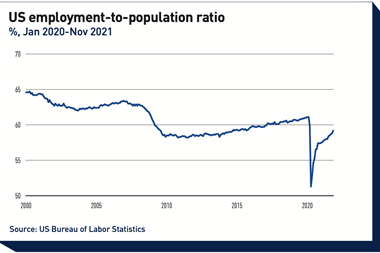Denmark’s Financial Supervisory Authority (FSA, Finanstilsynet) is warning of increased uncertainty about risks for the country’s financial sector, in its latest report outlining the current risk picture for the industry, including pension funds.
In the report, published today, the watchdog said: “The macro-financial risk picture is again characterised by increased uncertainty as a result of the omicron variant, and the increased infection over the winter increases the uncertainty of the economic progress.”
There was continued general economic growth, it said, adding that according to recent assessments from the IMF and OECD, global growth of between 4.5% and 5.0% was expected this year.
“However, according to the OECD, global growth has lost momentum due to global imbalances, and the OECD has therefore downgraded its growth expectations in December 2021,” the FSA said.
Market expectations of inflation in the EU and the US had risen significantly since the beginning of 2021, it said, and even though the IMF, the OECD, the European Central Bank (ECB) and the Federal Reserve all expected inflationary pressures to be temporary, both the Fed and the ECB had taken the first steps to tighten monetary policy.
“The current outlook leads to some uncertainty about inflation,” the FSA said.
”If there is an increasing wage pressure, it will put new upward pressure on prices. It will pull things in the direction of current high inflation perhaps becoming more persistent, which may lead to the central banks are tightening monetary policy faster than planned,” it said.
Stock markets continued to be characterised by confidence in the economic recovery, it said, although recent months had been marked by increased uncertainty and volatility.
US, Danish and European shares prices were all now higher than before the pandemic, though European stocks had taken longer to recover, it said.
“The big question is whether this development will continue,” the FSA said.
Negative interest rates meant households were more likely to invest in shares, it said, so were there to be a major shock to the stock market, household wealth would be more affected than before.
Regarding customer confidence in pensions, the FSA warned that the proliferation of non-guaranteed products meant customers’ pension payments could be affected if risks materialised.
If customers were not aware in advance that they bore risks themselves, this could lead to dissatisfaction and mistrust, the supervisor said.
“This is especially true if pensions suddenly have to be reduced significantly due to significant market value losses in the investment portfolio,” it warned.
The FSA highlighted in its report several supervisory drives that it was working on in the pensions sphere at the moment, including ensuring that pension companies continuously focussed on whether their products fulfilled the purpose of the pension savings, and that the products were adapted to the given customer group.
Other relevant pensions supervisory work included a focus on pension firms’ handling of the non-guaranteed pension products, and a thematic investigation into their investments in private equity and their valuation of these, according to the report.









